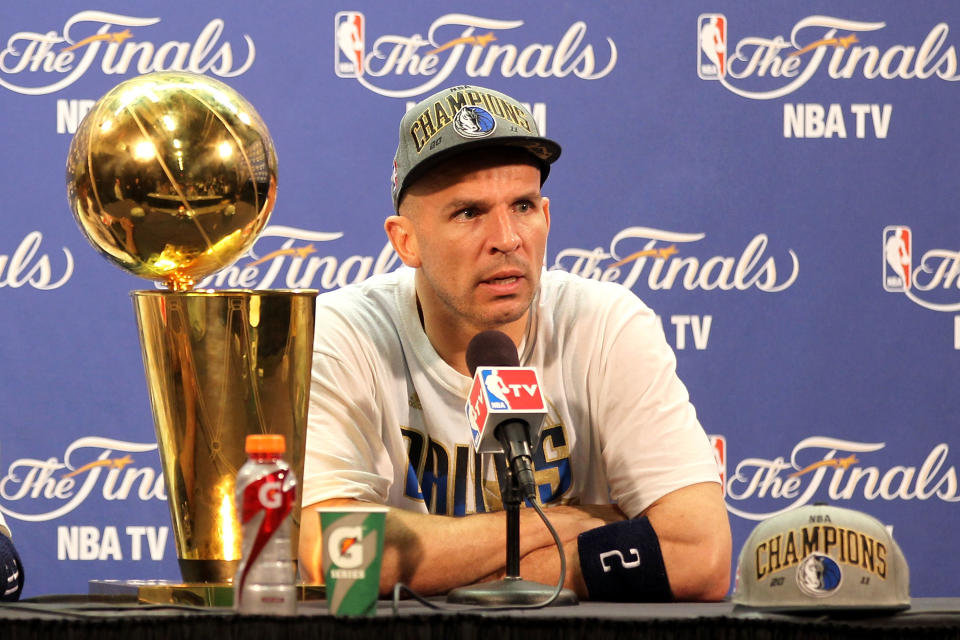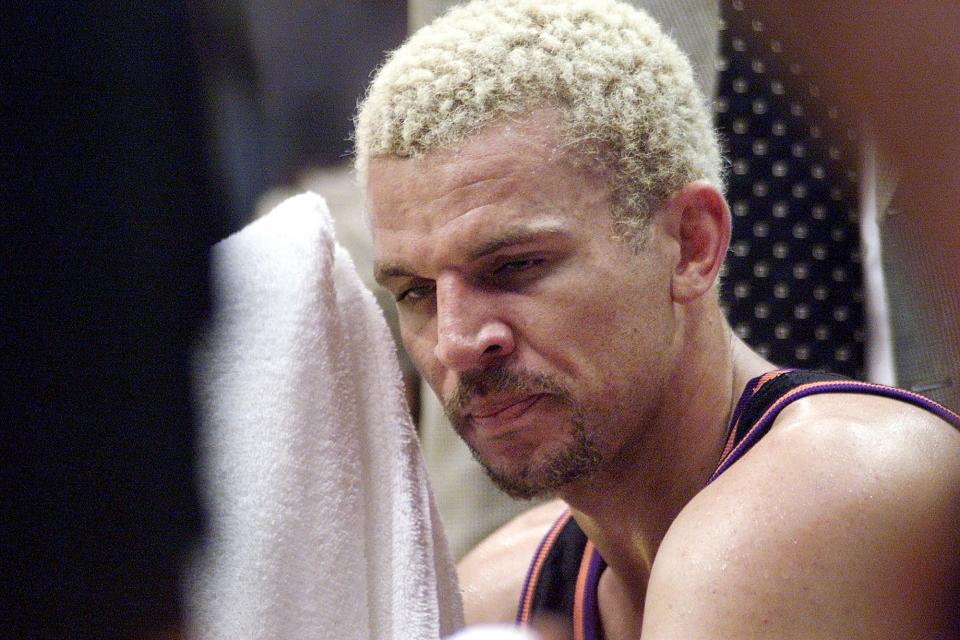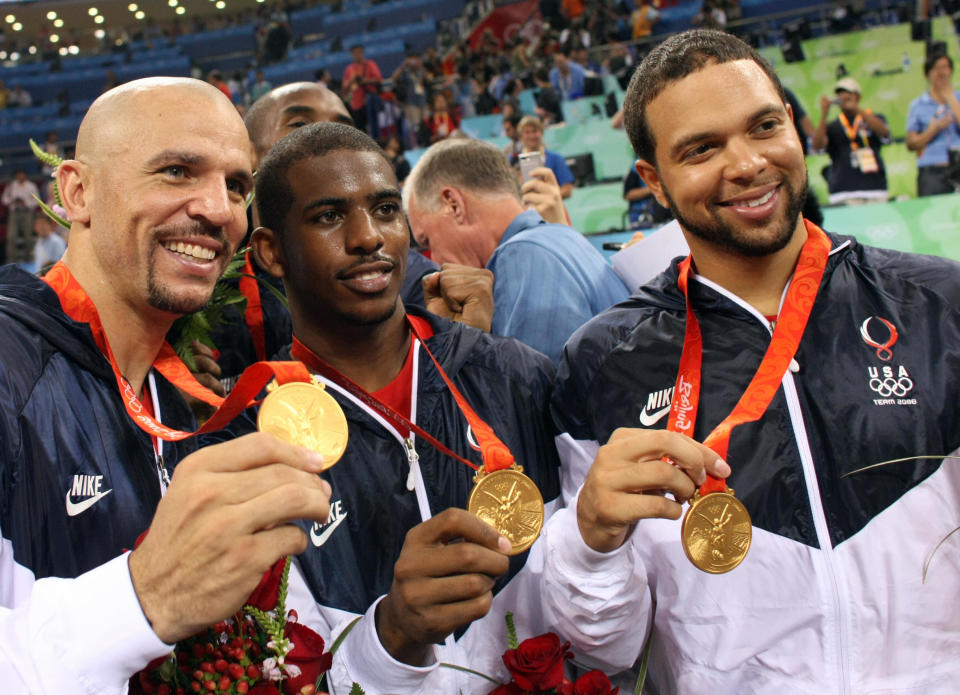The many faces and places of Jason Kidd's Hall of Fame NBA playing career

Jason Kidd’s coaching career requires its own book. His failed power play in Brooklyn, followed by a third-place Coach of the Year finish in Milwaukee, came with three playoff appearances in four chances before his welcome wore out in both places. This weekend, the 10-time All-Star will enter the Naismith Memorial Basketball Hall of Fame as a player, and his 19-year career followed similar peaks and valleys, where the wins always outweighed the losses on the court, and life off of it complicated his legacy.
Here are the eight faces of Kidd’s transformative NBA tenure that will be bronzed in Springfield, Mass.:
The rumored Toni Braxton love triangle
Kidd was involved in one of the NBA’s most notorious beefs — a supposed love triangle involving Mavericks teammate Jim Jackson and R&B singer Toni Braxton that tore apart the franchise in 1996.
Drafted second overall in 1994, Kidd captured co-Rookie of the Year honors in 1995 and started the NBA All-Star Game in 1996. In between, the Mavs improved from a 13-win outfit to a team bordering on playoff sustainability with an under-25 core of Kidd, Jackson and Jamal Mashburn — the Three J’s.
Then, the Mavs traded Kidd to the Phoenix Suns in December 1996 and dealt the other two a couple months later, setting the franchise’s rebuilding effort back until Dirk Nowitzki was drafted in 1998. Rumor had it that Braxton called off a date with Kidd to go out with Jackson, and the tryst somehow caused a locker-room rift between all Three J’s. The singer added fuel to the fire when she appeared on a Dallas radio station to promote her 1996 album “Secrets” and said, “I can never kiss and tell.”
While Mashburn said in 2015, “She definitely cost me relationships with Jimmy Jackson and Jason Kidd,” he dismissed the love triangle aspect of the Braxton legend. Jackson downplayed Braxton’s involvement, and Kidd has outright denied ever even meeting her. Nevertheless, locker-room animus led to one of the greatest players of his generation being traded not two years into his career.
Domestic abuse charges in Arizona
After being traded to the Suns for a package centered around former and future All-Stars Sam Cassell, Michael Finley and A.C. Green, Kidd emerged as the NBA’s undisputed Point God in Phoenix, capturing First Team All-NBA honors and leading the league in assists for three straight seasons from 1998-2001. The groundwork for his uptempo and unselfish brand of basketball, which paved the way for the next generation’s point guard revolution, was laid here, where he led the Suns to the playoffs every year.

Kidd’s second NBA stay also ended abruptly and in controversy. In January 2001, he was arrested in Arizona when his wife, Joumana, accused him of slapping her in front of their 2-year-old son. After pleading guilty to spousal abuse, Kidd was ordered by the court to pay a $200 fine and attend anger management classes for six months. At the end of the season, he was traded for Stephon Marbury.
Kidd’s rise in New Jersey
Richard Jefferson often tells the story of Kidd’s arrival in New Jersey. “I literally almost wrecked my car on the freeway,” Jefferson told ESPN in 2013, recalling the moment he found out the Nets had traded Marbury for Kidd. “I think I knew it before everyone else — ‘Oh, we are going to be really, really good.'”
It didn’t take long for the rest of the organization to come to the same realization. Kidd guaranteed a 2002 playoff berth at a preseason team dinner and wowed his teammates as the maestro of a well-orchestrated fast break in training camp. The triple-doubles came easy, and the wins followed.
With Jefferson, Kenyon Martin, Kerry Kittles and Keith Van Horn in tow, Kidd led the Nets to NBA Finals appearances in his first two seasons in New Jersey, losing to the Lakers in 2002 and Spurs in 2003. He finished top-10 in MVP voting each of his first four years on the Nets, finishing second to Tim Duncan in 2002. Even as knee injuries and coaching disputes mounted, Kidd led them to the playoffs every full season he played in New Jersey, earning an on-court reputation for mental and physical toughness.
‘I thought I was going to be a Spur’
When Tony Parker wrote an open letter to San Antonio for The Players’ Tribune this month, he made reference to the Spurs’ 2003 free-agent pursuit of Kidd. After Gregg Popovich’s charges beat Kidd’s Nets en route to their second of five NBA titles, the Spurs made pairing Kidd and Duncan — two of the all-time greats at their positions — their top priority. It’s the biggest what-if of Kidd’s playing career.
“I thought I was going to be a Spur,” Kidd revealed to reporters more than a decade later. “I committed when I was down there on my visit [to San Antonio]. On my flight home, I think I got cold feet, and sometimes I have nightmares about that. Maybe I could have won a championship or two there.”
Instead, Kidd signed a six-year, $103.6 million max contract to stay with the Nets.
Kidd’s fall in New Jersey
Off the court, Kidd met more controversy. He filed for divorce in January 2007, charging Joumana with domestic abuse, “extreme cruelty” and jealousy. His wife sued him in response, alleging binge drinking, excessive gambling, serial adultery and “years of physical abuse.” She accused Kidd of punching, kicking and choking her, including when she was pregnant with the first of their three kids.
In December of that same year, a 23-year-old model sued Kidd for allegedly groping and threatening her at a Manhattan nightclub just prior to the 2007-08 season. Despite accusations that Kidd “grabbed the woman again, pushing her against a wall and putting his hand under her dress,” even after bouncers intervened, the New York City district attorney’s office never pursued charges against him.
Two months later, the Nets traded Kidd back to the Mavericks for a package built around Devin Harris and a pair of first-round draft picks. Afterwards, New Jersey general manager Rod Thorn told reporters, “It became evident to me that his heart wasn’t in it anymore,” citing a December 2007 incident in which Kidd sat out a game with what he said was a headache as the impetus for trade discussions.

Captain America at the 2008 Beijing Olympics
Seven years after leading USA Basketball to a gold medal in the Sydney Olympics, Kidd enlisted for Team USA duty again as a 35-year-old veteran in 2008. Captain of a group that included Kobe Bryant and LeBron James, Kidd played sparingly as a starter before Chris Paul took over, but it was his contributions as a vocal leader that caught the attention of the NBA’s next generation of star talent.
“One of the greatest point guards to ever play, one of the smartest basketball players to ever play,” Chris Bosh told Yahoo Sports last month on the 10th anniversary of that 2008 Redeem Team. “Just seeing his leadership style and what he was trying to improve on, that was the biggest thing I took away. You’re with all these great, great players, and everybody is trying to improve on something.
“I remember J-Kidd was working on his shooting relentlessly after every practice. He was just working on basics and fundamentals to shooting, and I mean, he was relentless with it. Just seeing those guys and how easy it was to play with them and how good they were, and then the fact that, ‘Oh, man, they’re just like me, they want to improve.’ That’s Jason Kidd, man, and he’s controlling the floor.”
Kidd captured two gold medals and finished with a 16-0 record in two tours of USA Basketball duty.
An unwavering pursuit of a ring pays off
That relentless work on his jump shot paid off for Kidd in Dallas. Where long-distance shooting was once considered his Achilles heel, he transformed himself into a legitimate 3-point threat at age 35, logging his only two 40 percent 3-point shooting campaigns in his first two years back with the Mavs.
His playmaking and defense experienced similar evolutions. Once a human fast break, he steadied Dallas’ half-court offense, finding Nowitzki in the space created by his own shot-making. And of course the reverse was true when Nowitzki found Kidd for a corner 3 that broke a 105-105 tie in overtime of Game 4 in the 2011 Western Conference finals, delivering the Mavs a 3-1 lead against Oklahoma City.
Once a mainstay on the NBA’s All-Defensive rosters, Kidd used his craftiness to make up for the several steps he had lost defensively at age 38. This was evident in spurts guarding Kobe Bryant, Kevin Durant and LeBron James during the 2011 playoff run that ended in his first and only NBA title.
As he had done with Byron Scott in New Jersey, Kidd clashed with Avery Johnson in Dallas, leading to the coach’s firing. Kidd’s veteran leadership from Team USA carried over to the Mavericks, and while his hard-headedness led to spats with Rick Carlisle, too, they bonded over their competitiveness.
“Things only got contentious when we were losing,” Carlisle, whose relationship with Kidd has since grown into a friendship, told ESPN in 2015. “I mean, you’re talking about a guy who’s one of the most resourceful winners in the history of the game and whose moods were totally influenced by winning and losing. So when we were going good, things were good. And when we were losing, it killed him.”
The end of the road in New York
In the summer of 2012, following a post-title season filled with the sort of back and leg ailments you expect from a well-traveled legend and champion, the player who transformed the point guard position signed in the city that shaped it. After four-plus seasons and five playoff appearances in Dallas, Kidd signed a three-year deal with the New York Knicks that would take him well past his 40th birthday.
Four days later, he snapped a utility pole in two and hit a few trees when his SUV sped 25 feet into a wooded area in the Hamptons, according to police. Police reportedly removed him from the vehicle as electrical wires hung overhead and arrested him for driving under the influence. The details are lurid.
Kidd pleaded guilty in October 2013, when the resulting suspension delayed his Nets coaching debut by two games, so he was free to play in 2012-13. And play he did. Again a veteran leader tasked with correcting a team’s course, Kidd helped steer Carmelo Anthony’s Knicks to 54 wins, the franchise’s highest win total in the last two decades, missing only a handful of regular-season games in the process.
The wheels fell off in the playoffs, where Kidd was scoreless in his last 10 games, including their second-round series against the Indiana Pacers, when he was benched in the final two games of his career. He retired two weeks later after 19 seasons, the last 17 of which he made the postseason.
“Everyone can use the word Father Time — it’s undefeated. I think it’s the right time for me to move on to the next chapter,” he told ESPN Radio of an announcement that surprised the Knicks. “Everyone will talk about the month I had, but I didn’t come in the league as a scorer. I guess I’ll leave that way, too.”
– – – – – – –
Ben Rohrbach is a writer for Yahoo Sports. Have a tip? Email him at rohrbach_ben@yahoo.com or follow him on Twitter! Follow @brohrbach
More from Yahoo Sports:
• Missouri college takes action over Kaepernick ad
• Rockies slugger hits historic home run on big night
• Jeff Passan: Why surgery may not be so devastating for Ohtani
• Henry Bushnell: How winning the Super Bowl changed Philly

